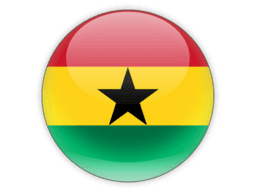
Cities of Ghana
Discover 50 cities across 11 regions
Ashanti(6)
Bono East(2)
Central(6)
Eastern(6)
Greater Accra(14)
Northern(2)
Upper East(2)
Upper West(2)
Ghana is a country in West Africa located on the Gulf of Guinea. It is bordered by Cote d'Ivoire to the west, Burkina Faso to the north, Togo to the east, and the Atlantic Ocean to the south. Ghana has a population of approximately 32 million people, and its capital and largest city is Accra.
Ghana is a constitutional democracy with a presidential system of government. The country has a diverse economy that includes agriculture, mining, manufacturing, and services. It is the second-largest producer of cocoa in the world, and it also has significant gold, oil, and timber reserves.
Ghana is home to a rich cultural heritage, with a mix of indigenous traditions and influences from colonialism and globalization. Its people are known for their hospitality, music, and dance. Popular cultural celebrations include the Homowo festival, which celebrates the end of the rainy season and the start of the harvest, and the Aboakyir festival, which features a hunting contest between two groups.
Ghana has made significant progress in reducing poverty and improving access to education and healthcare in recent years. It is also known for its contributions to the pan-African movement, with figures like Kwame Nkrumah, the country's first president, playing a prominent role in advocating for African unity and independence from colonial powers.
Telephone Code
233
Local Emergency Phone
Ambulance: 776111-5; Fire: 192; Police: 999, 171
Vaccinations
An International Certificate of Vaccination for yellow fever is required for all travelers. See WHO recommendations.
Climate
Tropical; warm and comparatively dry along southeast coast; hot and humid in southwest; hot and dry in north
Currency (Code)
Cedis (GHC)
Electricity/Voltage/Plug Type(s)
230 V / 50 Hz / plug types(s): D, G
Major Languages
Asante, Ewe, Fante, Boron, Dagomba, Dangme, Dagarte, Kokomba, Akyem, Ga
Major Religions
Christian 71.2% (Pentecostal/Charismatic, Protestant, Catholic, other), Muslim 17.6%, traditional 5.2%
Potable Water
Opt for bottled water
International Driving Permit
Suggested
Road Driving Side
Right
Tourist Destinations
Kakum National Park; Accra (includes Artists Alliance Gallery); Labadi Beach; Cape Coast
Major Sports
Soccer, boxing
Cultural Practices
If eating from a communal bowl, it is considered impolite to reach to parts of the bowl that are far from you. Instead, simply eat the portion directly in front of you.
Tipping Guidelines
Tips are not expected in restaurants, except at upscale locales frequented by foreigners, in which case a 5-10% tip is acceptable. Tip hotel porters 1-2 cedis and chambermaids at least 2 cedis per day. Taxi drivers expect a tip of 5-10% of the fare.
Souvenirs
Handmade beads, woven Kente cloth, gold and silver jewelry, carved stools, pottery
Traditional Cuisine
Fufu — cassava and unripe plantains mashed together in water with a wooden pole; once the mixture is smooth it is shaped into small balls that are placed in a stew or soup with meat
Geography
Area
total: 238,533 sq km
land: 227,533 sq km
water: 11,000 sq km
Climate
tropical; warm and comparatively dry along southeast coast; hot and humid in southwest; hot and dry in north
Natural resources
gold, timber, industrial diamonds, bauxite, manganese, fish, rubber, hydropower, petroleum, silver, salt, limestone
People and Society
Population
33,846,114 (2023 est.)
Ethnic groups
Akan 45.7%, Mole-Dagbani 18.5%, Ewe 12.8%, Ga-Dangme 7.1%, Gurma 6.4%, Guan 3.2%, Grusi 2.7%, Mande 2%, other 1.6% (2021 est.)
Languages
Asante 16%, Ewe 14%, Fante 11.6%, Boron (Brong) 4.9%, Dagomba 4.4%, Dangme 4.2%, Dagarte (Dagaba) 3.9%, Kokomba 3.5%, Akyem 3.2%, Ga 3.1%, other 31.2% (2010 est.)
Religions
Christian 71.3% (Pentecostal/Charismatic 31.6%, Protestant 17.4%, Catholic 10%, other 12.3%), Muslim 19.9%, traditionalist 3.2%, other 4.5%, none 1.1% (2021 est.)
Population growth rate
2.19% (2023 est.)
Government
Government type
presidential republic
Capital
name: Accra
Economy
Economic overview
West African trade and agrarian economy; COVID-19 reversed nearly 4 decades of continuous growth; major diamond, gold, cocoa, and oil exporter; high public debts; financial and energy sector reform programs adding to fiscal pressures; high remittances
Real GDP (purchasing power parity)
$178.455 billion (2021 est.)
Real GDP per capita
$5,400 (2021 est.)
Agricultural products
cassava, yams, plantains, maize, oil palm fruit, taro, rice, cocoa, oranges, pineapples
Industries
mining, lumbering, light manufacturing, aluminum smelting, food processing, cement, small commercial ship building, petroleum
Exports
$23.901 billion (2021 est.)
Exports - partners
Switzerland 23%, United Arab Emirates 12%, China 12%, India 9%, Netherlands 5% (2020)
Exports - commodities
gold, crude petroleum, cocoa products, manganese, cashews (2019)
Imports
$25.967 billion (2021 est.)
Imports - partners
China 42%, Netherlands 5%, United States 5%, India 5%, United Arab Emirates 3% (2020)
Imports - commodities
refined petroleum, cars, rice, delivery trucks, iron (2020)
International Airports in Ghana
Discover 5 major airports serving Ghana
Mark Ghana as Visited
Add Ghana to your personal travel map and track your journey around the world. Share your adventures and see your progress grow!